July 2020 Blues Vol 36 No 7
- Text
- Barron
- Heroes
- Health
- Award
- Heroes
- Reset
- Aftermath
- Stories
- News
- News
- Released
- Conference
- Enforcement
use force against. It
use force against. It also requires statewide use of body cameras and sets rules on when footage must be made public. Departments have until 2023 to buy the equipment for all their public-facing officers and implement policy regarding their use. The law’s fiscal note estimates departments would pay approximately ,250 for each camera and an additional ,200 a year, per camera, to store data. “For an agency requiring 100 cameras, first-year costs would total 5,000 and second and future year costs would be 0,000,” the fiscal note states. The difficulty of implementing new data collection requirements for depends on the size of the department. The 29 officers of the Steamboat Springs Police Department will be manually entering the data into an Excel spreadsheet until the agency can figure out a solution with their technology provider, Chief Cory Christensen said. Making that data collection change in larger departments is more complicated. The traffic unit of the Douglas County Sheriff’s Department makes about 20,000 stops a year, Spurlock said. “That’s a lot,” Spurlock said. “That’s not just done with a pencil and an eraser and a Big Chief pad. We have to change our technology.” The Denver Police Department’s attempt at racial data collection illustrates how complex it can be. The department spent two years developing a pilot program after years of criticism that officers were profiling black and brown drivers, and all Denver police officers have been recording demographic data on their discretionary contacts since January 2019 That data is being analyzed by the Center for Policing Equity, and a report has not yet been issued. There is no timetable for when a report analyzing the data will be released, Denver Public Safety records analyst Andrea Webber said in an email. BROADER POWER FOR THE COLORADO ATTORNEY GENERAL In the wake of the killing of De’Von Bailey by Colorado Springs police officers, people called for the state’s attorney general to investigate. Although the new police law still would not allow the office to look into an individual case, the state’s top lawyer can sue agencies with a pattern of misconduct. Colorado Attorney General Phil Weiser said he is still looking at how to handle that responsibility. The office’s Special Prosecutions Unit, which works complex investigations such as tax fraud, will handle the cases, he said. Weiser said he didn’t know what kind of evidence he would need to determine if a department was routinely abusing its powers, though he pointed to the Ferguson Police Department as an example of an agency that needed to be investigated. The U.S. Department of Justice investigated the Missouri agency after the killing of Michael Brown and found a pattern of unconstitutional policing. The new law also mandates the Colorado Peace Officer Standards and Training Board, overseen by Weiser’s office, create a database of all officers who have lost their certification because they lied or were fired for cause. The database is something Weiser said he’s wanted since he took office. “I’m a big believer in that sunlight is one of the best disinfectants,” Weiser said. The measure expands on a law passed in 2019 that mandates that officers caught lying must be decertified by the state’s Peace Officer Standards and Training Board. So far, no officers have been decertified under that law, said Lawrence Pacheco, the attorney general’s spokesman. WHAT WE’RE DOING NOW MAY NOT BE ENOUGH Even with all the new requirements, more change is likely imminent. Weiser said he is working with the POST board to reconfigure what are considered core competencies for police officers. He also plans to announce changes related to police in schools. “If all you have is a hammer, everything looks like a nail,” Weiser said. “And some of our school resource officers are very proactive about citing teenagers.” Creager, the Broomfield police chief and president of the chief’s association, said he is intrigued by the movement to defund police. “When we say defund, or shifting resources to other places, I’m fascinated by that,” Creager said. “What that’s going to look like, I don’t know, but I think there’s value in that conversation.” Officers’ roles and responsibilities have expanded over the last decades and Creager said that while officers can be trained on a specific topic, like mental illness, there’s only so much they can do. “There was a lot of change that came after Rodney King, but not enough,” Creager said. “There were a lot of changes that came after Ferguson, but not enough. If history tells us anything, what we’re doing now may not be enough, so we have to be open to that.” Here are some of the major changes included in the 25-page law: • Body cameras: Nearly every public-facing officer in the state will have to use body cameras by July 1, 2023, and officers could face charges for tampering or purposely failing to activate their cameras. Footage will be required to be released within 21 days after an allegation of misconduct, or within 45 days if the release could jeopardize a criminal investigation. • Use of force: Effective immediately, police are banned from using chokeholds and carotid control holds. Effective Sept. 1, officers can only use force if absolutely necessary and deadly force can’t be used against someone for a minor or nonviolent offense. Officers can only use deadly force against someone fleeing from police if they pose an immediate risk to the officer or others. • Failure to intervene: An officer who fails to try to stop another from using excessive force could face charges. • Fired cops: Officers who plead guilty to or are convicted of an inappropriate use of force, failing to intervene, or found civilly liable for excessive force or failure to intervene will lose their certification permanently. The POST board will create a database of decertified, fired and lying officers beginning Jan. 1, 2022. • Qualified immunity: People who allege civil rights violations will be able to sue officers in their individual capacities. Officers determined not to have acted in good faith or with a reasonable belief that what they did was legal can be held personally liable for 5% of a judgment or settlement, up to ,000. • Police prosecutions: The state attorney general has the authority to prosecute persistently bad departments and officers. • Protester protections: Officers are prohibited from shooting rubber bullets indiscriminately into a crowd or targeting someone’s Continued on Page 55 26 The BLUES POLICE MAGAZINE The BLUES POLICE MAGAZINE 27
- Page 1 and 2: CELEBRATING 35 YEARS OF SERVICE TO
- Page 4: 4300 2351 281.204.8770 hpigrp.com
- Page 8: If this doesn’t work, we’ll try
- Page 12: ANOTHER STAND AT THE ALAMO I’m go
- Page 16: 0,000 ..what it won’t get you.
- Page 20: HCSO Sgt. Fired for Racist Facebook
- Page 24: Colorado law enforcement begin to i
- Page 30: Two Heroes Emerge from the Aftermat
- Page 34: ism had cratered and never came bac
- Page 38: unning for heroes Running for Heroe
- Page 42: 42 The BLUES POLICE MAGAZINE The BL
- Page 46: History of the Conference The Sheri
- Page 50: Micro Wedding Season With regards t
- Page 54: Continued on Page 27 Continued from
- Page 58: Police Officer Dale Thomas Provins,
- Page 62: Tarrant County Hospital District PD
- Page 66: 66 The BLUES POLICE MAGAZINE The BL
- Page 70: Entire Kemah Police Department is u
Inappropriate
Loading...
Mail this publication
Loading...
Embed
Loading...




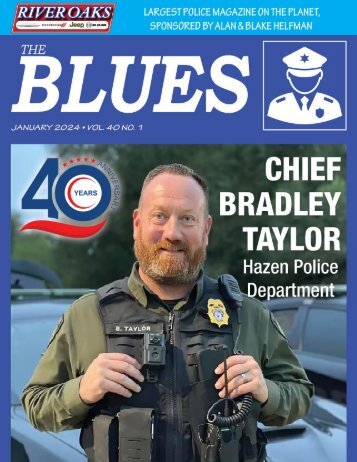












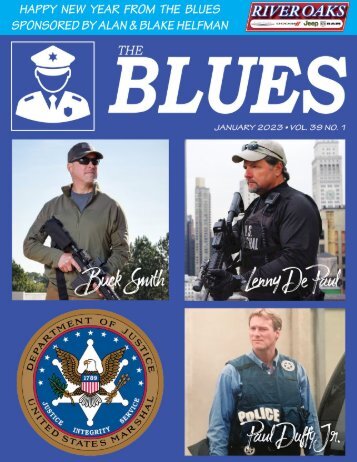






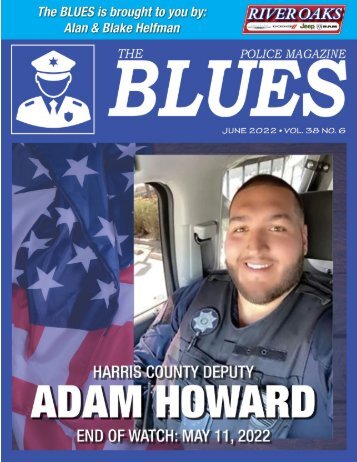




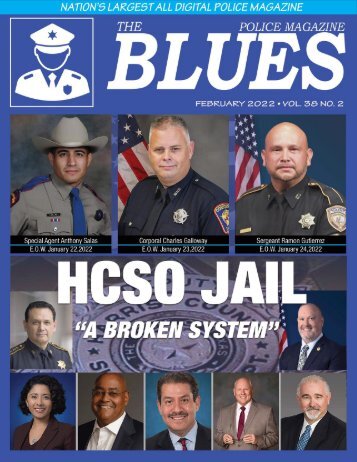
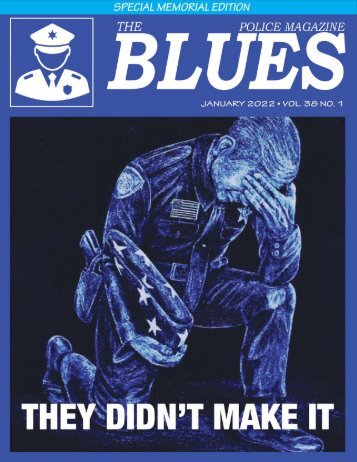


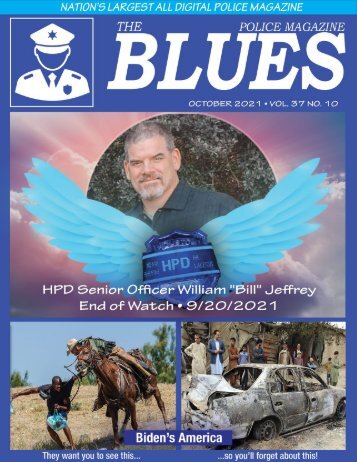









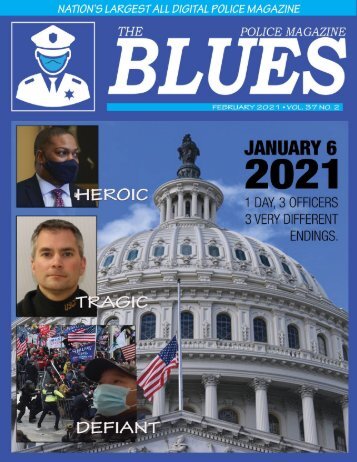













Follow Us
Facebook